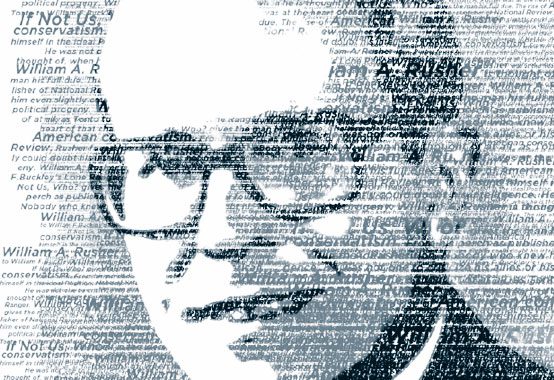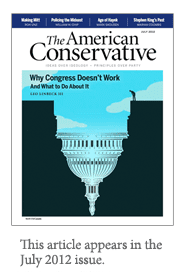Gentleman Bruiser

Bill Rusher is thought of, when he is thought of at all, as Tonto to William F. Buckley’s Lone Ranger. As David Frisk makes clear in his well-researched and enlightening new biography, that is a sad underestimation of the man.
Buckley’s conciliatory style, personal charm, and family money were essential to bringing together—and holding together—the various disparate strains of an inchoate intellectual conservatism in the founding of National Review. Without his wit, élan, and celebrity, the word “conservative” would never have achieved respectability, much less become the dominant political force in the country.
But style does not build a house. The lumber has to be cut and shaved, nails have to be hammered, workers recruited, plans made and revised. Bill Rusher was instrumental—and after reading this book, I might even say indispensable—to building what we now call the conservative movement.
From his perch as publisher of National Review, Rusher found himself in the ideal position to cajole, encourage, promote, and temper the fledgling organizations that were later to form the ground troops for the conservative revolution. But most important of all, his well-formed political instincts, honed in years of Young Republican infighting, came to bear on the single most important event in coalescing these troops into a unified movement: getting Barry Goldwater to seek the Republican nomination in 1964 and, against all odds, to win it.
How Rusher played an obstinate Goldwater, ignoring his refusals to run, smoothing over his political worries and personal concerns, and finally forcing his hand with the Draft Goldwater Committee, is as dramatic a tale of psychological diplomacy as I have ever read. Once Goldwater committed, it was Rusher who recruited Peter O’Donnell—a brilliant and wealthy young tactician who had managed John Tower’s 1961 special-election upset to become the first Republican senator from Texas since Reconstruction—to lead the fight for the nomination.
As Bill Buckley once remarked to me, there can only be one sun—and at National Review, there was no doubt whatsoever who that sun was. Consigned to the role of sidekick, Rusher sometimes chaffed but never rebelled. As Buckley’s fame increased the magazine’s importance grew, and Rusher skillfully employed both in achieving his life’s sole ambition: to dismantle the liberal political consensus that dominated the postwar period.
Nobody who knew him even slightly could doubt his intelligence, his deep erudition, his zest for life, and his focused determination. But the mild manner, the precise language, the lawyerly demeanor, and the orderly habits—his desk was always clean—hid a ferocious heart.
Rusher was a fighter. He took no prisoners, gave no quarter, and cared not a whit for anyone’s feelings. Bill Buckley would attract, engage, and convert. Bill Rusher was out to destroy.
The advent of late-night talk radio in the ’60s gave him his arena. The Fairness Doctrine was still in force, so hosts had to provide two sides to discuss the controversies of the day. One side may have come to discuss; Rusher came to debate. The other side may have brought notes on yellow legal pads; Rusher brought a carving knife. Time and again, to the delight of the listening audience, he filleted his liberal counterparts and, for good measure, sliced to pieces any host who came to their defense.
Frisk provides the transcript from the Barry Farber Show in 1970 in which Ted Sorenson, who was preparing to run for Senate in New York, found himself surgically dissected at Rusher’s hand. It makes for fun reading, but it also reveals much about Rusher’s style. In the ring, he did not dance and weave. He provoked an opening, went in close, and pounded with his right and his left until the opponent lay flat on the floor. Sorenson never recovered. Needless to say, he did not become a senator from New York.
Success in radio led to television, and for three years Rusher was the star attraction on “The Advocates,” a debate program in the format of a trial, on PBS. The show was an immediate hit, and suddenly Rusher was almost as famous in his own right as Buckley. He did not relish the notoriety. He loved politics and debate, but reveling in the public limelight was not in his character. He was meant for the back room, where the deals are cut and the assignments made. After three successful years, he did not renew for a fourth, and the show lasted only one more season without him.
Meanwhile, he kept up an unrelenting schedule of meetings, conferences, and talks, all centered on building the infrastructure of a conservative movement capable of countering the overwhelming liberal dominance of the media, government, and policy institutions. He encouraged new organizations, lent his efforts to their fundraising, and served on their boards. In a sense, he became godfather to the web of think tanks, advocacy groups, and lobbying offices that now occupy Washington. Hillary Clinton was right. There is a “vast right-wing conspiracy.” Bill Rusher is the man responsible for it.
He was not one to criticize his allies or his political progeny, but I wonder what he would say of it now, this huge, well-salaried, self-preserving establishment of the right. In his 30 years at National Review (“31-and-a-half,” he often reminded me), he never earned more than $30,000 a year. Conservatism was not his career. It was his vocation, his mission, and his passion. “I was honestly surprised that they paid me anything,” he said one day, reminiscing about joining the magazine. “Considering the state of the finances, I thought I would have to pay them.” Then he added with a wink, “And what they didn’t know was that I would have.”
I knew Bill Rusher as a young admirer watching him eviscerate complacent liberals on air, then as a reader of his books, and finally as a fellow board member of National Review and his successor as publisher. David Frisk captures the man with a keen eye and with an obvious affection born of long study of his subject’s quirks and accomplishments. Integrity comes to us from the Latin integer, or whole, and Bill Rusher’s integrity was the result of his being a whole man, confident in his critique of American society and of the prescription for curing it.
At the last, Buckley and Rusher were like a couple in a 30-year marriage. Their idiosyncrasies, prejudices, and mutual disappointments were too well known to each other to be worth discussing. Each had played his role, each knew it, and that was enough. For all the fun times I enjoyed with Bill Buckley, I never saw him in such a delirium of delight as he was in planning the details of the magnificent Hudson dinner cruise that marked Rusher’s formal retirement from the magazine. The dinner was a complete success, and every little facet of it—from the guest list to the imprinting of cocktail napkins—was an act of love.
As for Rusher, he was glad to leave. For those like me who questioned why he was moving to such a bastion of liberal orthodoxy as San Francisco, he had prepared an index card that he carried in his breast pocket. It recorded the average temperatures of every major American city. San Francisco’s was a perfect 73 degrees, and that was his answer.
 Even in retirement, Rusher was called back to duty at NR. Frisk relates how Buckley at lunch with Rupert Murdoch in 1990 agreed to sell National Review to the media mogul for Murdoch’s promise of a $5 million investment. The agreement was presented as a fait accompli to me, then-editor John O’Sullivan, and Rusher—who had flown in from San Francisco at Buckley’s urgent request—at a tense meeting at WFB’s Stamford home. Buckley was known for having, in O’Sullivan’s words, “a whim of iron.” Once his mind was made up, he never changed it, no matter what mitigating facts were brought to his attention. Rusher knew better than to argue with Buckley. I didn’t. I said it was a bad decision, that it would betray the thousands of small contributors and subscribers who had kept the magazine afloat. Rusher took that as an opening and began, in his calm, lawyerly way, asking questions that framed the transaction as a public-relations disaster. Buckley—very reluctantly—changed his mind. Not long after, I was encouraged to pursue another career. O’Sullivan was given the same encouragement a little while after that. I doubt that Rusher was ever invited back.
Even in retirement, Rusher was called back to duty at NR. Frisk relates how Buckley at lunch with Rupert Murdoch in 1990 agreed to sell National Review to the media mogul for Murdoch’s promise of a $5 million investment. The agreement was presented as a fait accompli to me, then-editor John O’Sullivan, and Rusher—who had flown in from San Francisco at Buckley’s urgent request—at a tense meeting at WFB’s Stamford home. Buckley was known for having, in O’Sullivan’s words, “a whim of iron.” Once his mind was made up, he never changed it, no matter what mitigating facts were brought to his attention. Rusher knew better than to argue with Buckley. I didn’t. I said it was a bad decision, that it would betray the thousands of small contributors and subscribers who had kept the magazine afloat. Rusher took that as an opening and began, in his calm, lawyerly way, asking questions that framed the transaction as a public-relations disaster. Buckley—very reluctantly—changed his mind. Not long after, I was encouraged to pursue another career. O’Sullivan was given the same encouragement a little while after that. I doubt that Rusher was ever invited back.
David Frisk’s biography gives us a full portrait not only of a good man at work, but also of an era that saw one of the most abrupt changes in governing philosophy in American history. William A. Rusher was at the heart of that change, and it will be surprising for some to learn that on the political and organizational front he was its chief protagonist. If Not Us, Who? gives the man his due. It is invaluable reading for any student of the rise of American conservatism.
Wick Allison is chairman and editor in chief of D Magazine partners and president of the American Ideas Institute.
Comments